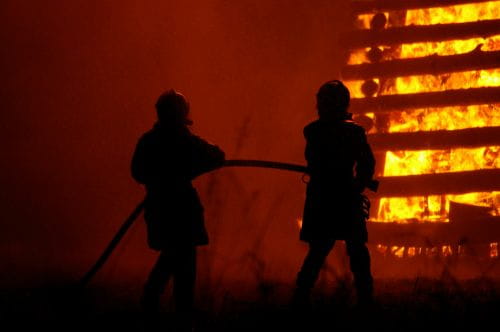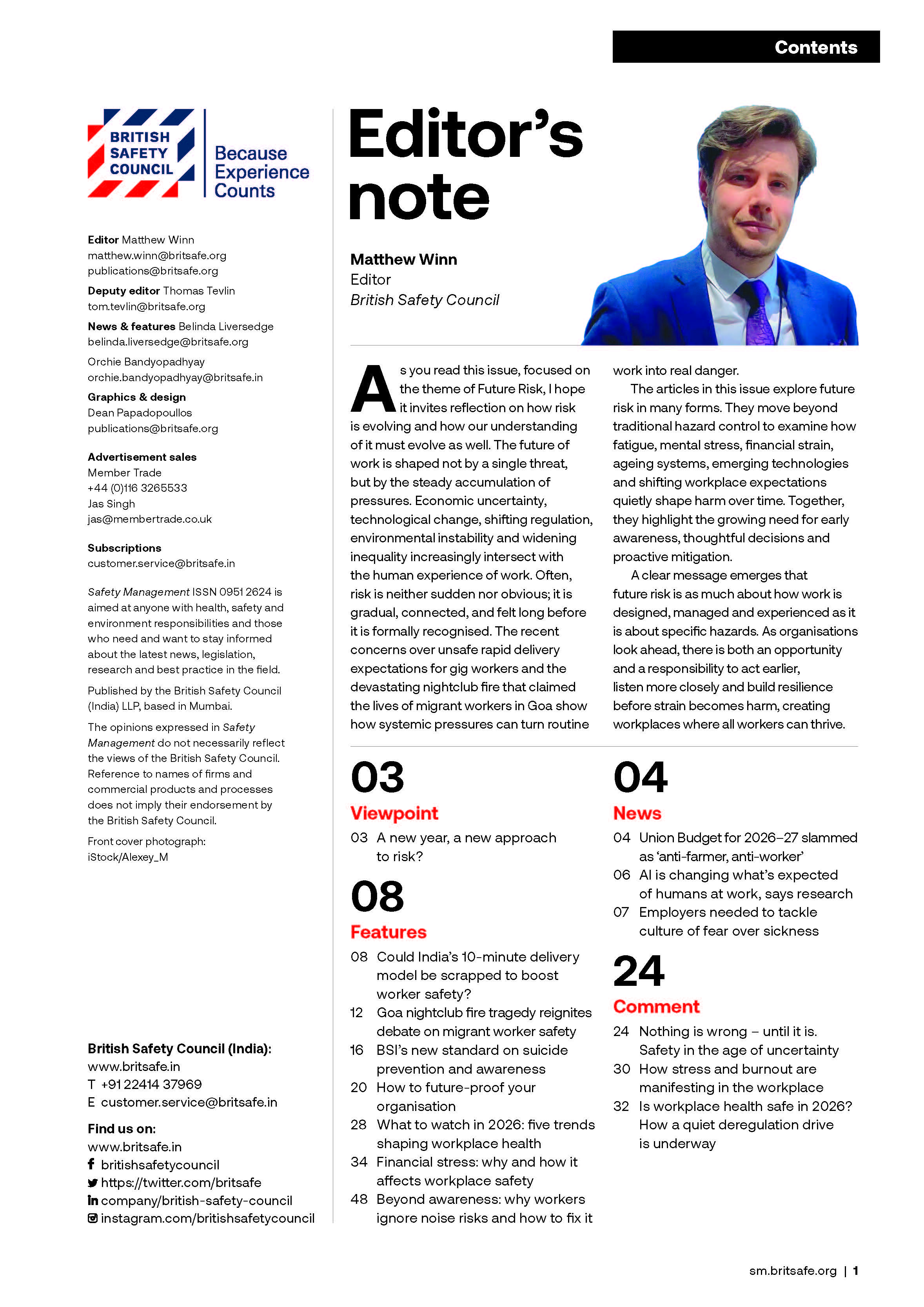The manual cleaning of human waste from sewers and septic tanks has long been banned in India due to the risk to life, but campaigners say scores of workers are still dying in sewers every year due to government inaction.
Features
Sewer deaths: the harsh reality
A year ago, when India announced a slew of measures to end the discriminatory and hazardous practice of manual scavenging by August 2021, union minister of housing and urban affairs Hardeep Singh Puri said in a tweet: “Delighted to launch Safaimitra Suraksha Challenge across 243 cities. Based on PM Modi’s vision to place safety and dignity of sanitation workers at the core of Swachh Bharat, it aims to ensure that no life is ever lost while cleaning sewer or septic tanks.”
Unfortunately, large numbers of manual scavengers continue to die every year while cleaning human excreta from sewers and septic tanks, primarily due to asphyxiation by poisonous gases.
 Photograph: Marcel Crozet/ILO Photos News, https://bit.ly/3k7M9HU
Photograph: Marcel Crozet/ILO Photos News, https://bit.ly/3k7M9HU
The year 2021 has already seen 26 deaths due to manual scavenging, said activist Bezwada Wilson, the national convener of the Safai Karmachari Andolan, a nationwide movement to eradicate the practice. Manual scavenging also includes cleaning excreta from dry latrines in homes and public places and from the tracks of railway stations, where it is discharged from the toilets of trains.
In 2019 alone, even as the country expanded the nationwide Swachh Bharat Abhiyan (Clean India Mission) to end open defecation, build toilets for homes in rural areas and mechanise sewage cleaning, 110 people died while cleaning sewers and septic tanks.
In the last five years to December 2020, 340 people died after inhaling noxious fumes or slipping in manholes.
According to data from the Municipal Corporation of Delhi, around 2,400 sanitation workers in the city region died before reaching the expected retirement age in the period 2013 to 2017. The causes of these deaths have been attributed to many health problems other than the direct work-related hazards, such as cholera from exposure to excreta. However, the most immediate danger to life is being asphyxiated by dangerous gases or oxygen depletion inside sewers and septic tanks.
Sewer cleaning ‘remains rampant’
Although India began to outlaw the employment of manual scavengers with the passing of the Employment of Manual Scavengers and Construction of Dry Latrines (Prohibition) Act, 1993, and punishments for employing them were introduced in a 2013 amendment to the Act, the practice remains rampant.
Activists say tens of thousands are involved in this demeaning work which opens them to prejudice and abuse.
The International Dalit Solidarity Network claims that around 1.3 million people in India, mostly women, are involved in manual scavenging, although mainly the cleaning of ‘dry’, surface level latrines, rather than underground sewers.
In a caste-based society, manual scavengers are almost exclusively Dalits, who are at the bottom of the social hierarchy and are also known as untouchables. To earn a wage, they take up the lowly job of cleaning, carrying and disposing of human excreta, often with their bare hands. They are rarely provided with the necessary personal protective equipment, such as breathing apparatus, when entering the sewers and septic tanks and large numbers are killed by inhaling harmful gases.
Despite stringent laws, employers still illegally force workers to climb into choked sewers and septic tanks to scoop out human excreta. “If employers force us to work without protective gear or go inside a septic tank, we are helpless – primarily because of our lack of bargaining power, illiteracy, social vulnerability and poverty,” said a sewer cleaner in Delhi.
A shocking incident reported in Delhi in March testifies to the fact. Two men, who were employed as waiters at a banqueting hall, died after they were forced to clean the building’s septic tank. According to the police, the victims had entered the tank without safety equipment, and died after inhaling toxic fumes.
The families of the men, 35-year-old Lokesh Kumar and 40-year-old Prem Chand, said the two were told they would not be paid for the day’s work as waiting staff if they didn’t clean the tank.
“It came as a surprise to us that Lokesh went into the septic tank to clean it, as he worked as a waiter,” said Lokesh’s brother, Deepak.
Like Deepak, Vimala Chorotiya, Nita Kalsekar and Bani Debnath were also surprised to learn their husbands had died while cleaning a septic tank in India’s richest state Maharashtra in December 2019. Govind Sangaram Chorotiya died after suffering a head injury, while Santosh Kalsekar and Vishwajit Debnath were killed after inhaling toxic gases inside the tank at a private society in Mumbai’s Govandi area.
“Govind worked at construction sites and buildings. He never did any cleaning jobs. I still do not know what must have happened and how he ended up taking up a septic tank cleaning job,” said Vimala.
Hailing from the cobbler community, which is classified as a Scheduled Caste in Rajasthan, Vimala says that no one in the family has ever worked as a manual scavenger. The mother of three is certain it was simply their place in the caste hierarchy that made it easy for the private contractor to push Govind into the “gutter”.
Nita and Bani also have similar stories and backgrounds. Bani’s husband was a skilled plumber, sometimes working as a loader, while Nita’s husband only worked as a labourer before the incident.
Nita belongs to the Scheduled Castes, while Bani is from an Other Backward Class (OBC) community, originally from a small village in north Bengal.
Compensation for sewer deaths
Soon after the incident, the three women took a bold step, and decided to take legal action. They petitioned Bombay High Court, seeking compensation and rehabilitation as guaranteed in the Prohibition of Employment as Manual Scavengers Act (PEMSA), 2013.
Nearly two years later, on 17 September 2021, the Bombay High Court issued a first-of-its-kind order, directing the state government to provide compensation to the three families within four weeks, in addition to providing an elaborate rehabilitation plan for them.
A division bench of Justices Ujjal Bhuyan and Madhav Jamdar passed an interim order in accordance with the decision of the Supreme Court in 2014, directing the Mumbai suburban collector (the district magistrate and head of local revenue collection), to pay each of the petitioners compensation of Rs.10 lakh.
In 2014, the apex court in the case of Safai Karamchari Andolan vs Union of India had ruled that Rs.10 lakh compensation must be awarded for every death resulting from the cleaning of septic tanks and sewers. The apex court also directed all of India’s states to ban manual scavenging and take steps to rehabilitate people engaged in latrine and sewer cleaning work.
The judgment was particularly clear on the provision of compensation and rehabilitation for people who work as manual scavengers. For example, the Supreme Court directed the government to “identify the families of all persons who have died in sewerage work (manholes, septic tanks) since 1993 and award compensation of Rs.10 lakhs for each such death to the family members depending on them”.
In its ruling in September 2021, Bombay High Court also called for information on how many manual scavengers have been killed at work in Maharashtra since 1993 and if the Maharashtra government had awarded compensation to their families.
Three decades after the abolition of manual scavenging, the court’s bench reiterated that the state government is responsible and liable for ensuring that the shameful practice is not carried out anywhere in Maharashtra.
“The Act of 2013 has clearly stated that all state governments have to ensure that manual scavenging is completely eradicated from society. However, despite such strict legislative intent, this shameful practice continues, and this should shock the collective conscience of society,” the court said.
Appearing for the petitioners, advocate Isha Singh said the fact that none of the three men who died had ever cleaned septic tanks is crucial.
“They were not equipped, their safety was not taken into consideration, and yet they were sent there to do such a dangerous job,” Singh pointed out. She added that the wives of the men have been wronged on too many levels.
Struggle for justice
Applauding the Bombay High Court order, Vimala Chorotiya emphasised that there are thousands of widows of sewer cleaners who are still struggling to get justice.
“We are poor people and we have to speak up for ourselves,” she said. “I don’t want money to be honest, I want to get justice for my three young children, a daughter and two sons, who suddenly lost their father.”
She added: “For me the most important thing is my children’s education.” Ever since their father died, the family has been struggling to survive financially.
Activists say the Bombay High Court’s directive is the first time the court has held the Maharashtra state government accountable for compensating the family members of those killed cleaning septic tanks or sewers, despite the fact the three men died while working on a private contract.
Many city and regional government authorities have been accused of employing subcontractors to manually clean drains and sewers, to escape legal liability.
However, the Indian central government continues to live in denial about the practice, despite regular news reports of manual scavengers dying of asphyxiation.
Human rights activists condemned the central government for its “inhuman and cruel” statement, when Ramdas Athawale, minister of state for social justice and empowerment, told the Upper House in Parliament in July that no deaths have been reported due to manual scavenging in the last five years.
Rejecting the claim, Bezwada Wilson, from the Safai Karmachari Andolan, said the minister’s statement assumes that manual scavenging only means the cleaning of dry latrines. “So, he [social justice minister Ramdas Athawale] must mention in his statement very clearly that in dry latrines people may not die but here in septic tanks people die. The government is denying everything and in the same manner, he is denying deaths due to manual scavenging.”
Wilson said at least 472 people have died cleaning human excreta between 2016 and 2020, and 26 so far in 2021. Wilson demanded an apology and a statement from the prime minister addressing the issue.
A week later union social justice minister Virendra Kumar told the Rajya Sabha that 58,098 manual scavengers had been identified across the country in two separate surveys in 2013 and 2018.
“There is no report of death due to manual scavenging,” he said. “However, we have reports regarding deaths of workers while being engaged in cleaning of sewers or septic tanks.” Kumar stated there have been 941 sewer deaths since 1993, when manual scavenging was first banned.
Tamil Nadu reported the highest number of such deaths at 213, followed by 153 in Gujarat, 104 in Uttar Pradesh, 98 in Delhi, 84 in Karnataka and 73 in Haryana, the data revealed.
Tamil Nadu authorities ordered to ensure no manual scavenging
Meanwhile, in October 2021, Madras High Court directed all heads of corporations and municipalities in Tamil Nadu to file written undertakings declaring that no manual scavenging work will be carried out within their jurisdictions.
“There cannot be any manual scavenging at all and it will continue to be the responsibility of all municipal bodies and corporations across the state [of Tamil Nadu] to ensure that there is no manual scavenging activity undertaken.
“The commissioners of the corporations and the heads of the municipalities will be personally held liable in case any manual scavenging activity is detected or any mishap occurs in course thereof,” the bench said, according to news agency PTI.
See the Safai Karamchari Andolan website for more information on manual scavenging.
FEATURES

India’s 10-minute delivery model: why working conditions could be about to improve
By Orchie Bandyopadhyay on 13 February 2026
India’s ‘10-minute’ quick-commerce home delivery model has been criticised for allegedly encouraging reckless riding by delivery workers, but the Government has now reportedly stepped in to urge the app platforms to abandon the time-bound delivery promise and do more to ensure the safety of the sector’s workers.

Migrant workers: Goa fire tragedy reignites debate on poor safety protections
By Orchie Bandyopadhyay on 13 February 2026
A deadly fire at a nightclub in Goa that claimed the lives of 20 migrant workers from across India made global headlines – and triggered fresh demands for government agencies to step up efforts to ensure the safety of low-paid workers in environments such as bars, nightclubs and hotels.




